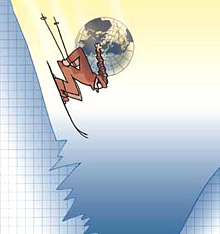
|
 |
 |
 Americas & Beyond | April 2008 Americas & Beyond | April 2008  
Many US States Appear to Be in Recession
 Associated Press Associated Press
go to original


| | The Commerce Department reported Thursday that sales of new homes plunged in March to the lowest level in 16 1/2 years. | | |
The finances of many states have deteriorated so badly that they appear to be in a recession, regardless of whether that's true for the nation as a whole, a survey of all 50 state fiscal directors concludes.

The situation looks even worse for the fiscal year that begins July 1 in most states.

"Whether or not the national economy is in recession - a subject of ongoing debate - is almost beside the point for some states," said the report to be released Friday by the National Conference of State Legislatures.

The weakening economy is hitting tax revenue in a number of ways: People's discretionary income is being gobbled up by higher food and fuel costs, while the tanking housing market means people are spending less on furniture and appliances associated with buying a house.

The situation is grim in Delaware, with a $69 million gap this year, and bleak in California, with a projected $16 billion budget shortfall over the next two years, the report said. Florida does not expect a rapid turnaround in revenue because of the prolonged real estate slump there.

By mid-April, 16 states and Puerto Rico were reporting shortfalls in their current budgets as the revenue those budgets were built on - typically, taxes - fell short of estimates. That's double the number of states reporting a deficit six months ago.

The NCSL said the news is even worse for the upcoming fiscal year, with 23 states and Puerto Rico already reporting budget shortfalls totaling $26 billion. More than two-thirds of states said they are concerned about next year's budgets.

The results are consistent with a drumbeat of bad economic news for states that several budget groups have produced in the past few months.

Last week, the Washington-based Center on Budget and Policy Priorities said 27 states are reporting projected budget shortfalls next year totaling at least $39 billion.

President Bush said Tuesday that the economy was not in a recession but a period of slower growth. However, some economists have pointed to the string of declines in manufacturing orders to argue that the economy has fallen into a recession.

Bolstering their position, the Commerce Department reported Thursday that sales of new homes plunged in March to the lowest level in 16 1/2 years. The government also reported that orders to factories for big-ticket goods fell for a third straight month in March, the longest string of declines since the 2001 recession.

Some states "have declined so much that they appear to be in a recession," the NCSL report said.

It also noted the silver lining for states where the economy is based on energy, such as North Dakota and Wyoming. Alaska is making so much money from oil that it announced an estimated surplus next year of $8 billion, almost twice the state's annual budget.

In North Dakota, revenue is above legislative predictions by 13 percent, and in Louisiana, the oil and gas sector is robust.

"For energy-producing states, the fiscal situation is strong and the outlook is good," the report said.

Among Other Findings:

• More than half the 16 states reporting deficits this year have cut spending, including $1 billion by Florida lawmakers last year and across-the-board cuts in Nevada. At least eight states are debating raising taxes or fees, including a proposed $1-per-pack cigarette tax increase in Massachusetts to raise $175 million.

• Twelve states, including Georgia, Idaho and Illinois, reported that personal income tax collections were failing to meet estimates, and in eight of these, collections were even below a reduced forecast.

• Many states, including Alabama, Arizona, Massachusetts, Minnesota, Nevada and Wisconsin, plan to tap their rainy day funds, which contain money set aside for fiscal emergencies. Nevada may use its entire rainy day balance.

On the Web: NCSL http://www.ncsl.org | 
 | |
 |



